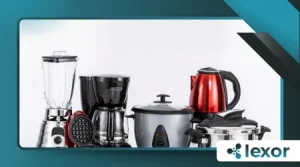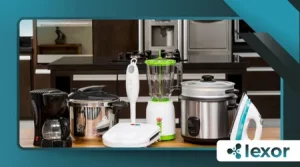Smart Kitchen Appliances That Make Life Easier

The kitchen has always been the heart of the home, but today, it’s also the epicenter of innovation. Smart kitchen appliances are transforming how we cook, store food, and manage our daily routines.
No longer just passive tools, these devices leverage AI, machine learning, and IoT connectivity to anticipate needs, automate tasks, and reduce waste.
Imagine a refrigerator that tracks expiration dates, an oven that adjusts cooking times based on real-time sensors, or a coffee maker that brews your morning cup as soon as your alarm goes off.
This isn’t science fiction—it’s the reality of modern smart homes. According to a 2024 report by Statista, 42% of U.S. households now own at least one smart kitchen device, a number expected to double by 2027.
But beyond convenience, these appliances offer tangible benefits: energy efficiency, precision cooking, and even health monitoring.
The question isn’t whether you should upgrade—it’s which devices will best fit your lifestyle.
Why Smart Kitchens Are Redefining Home Life

The shift toward smart kitchen appliances isn’t just about novelty—it’s about solving real-world problems.
Traditional kitchens require constant attention: preheating ovens, manually checking fridge inventory, and guessing cooking times. Smart tech eliminates these inefficiencies.
Take meal planning, for example. A smart refrigerator with internal cameras can scan its contents and suggest recipes based on what’s available.
++What Is a DAO? A Beginner’s Guide to Decentralized Organizations
Some models, like Samsung’s Family Hub, even sync with grocery delivery services, allowing you to restock with a single voice command.
Energy efficiency is another major advantage. Smart dishwashers, such as those from Bosch, use sensors to determine the optimal water and detergent levels, reducing waste.
Similarly, induction cooktops with AI-powered heat adjustment ensure no energy is wasted on overheating.
The psychological impact is equally compelling. A study by the American Psychological Association found that households with automated kitchen tasks reported 30% less stress related to meal preparation.
++How to Choose the Right Gaming Console for You
When technology handles the mundane, people reclaim time for creativity—or relaxation.
The Standout Innovators in Smart Kitchen Tech
1. Intelligent Refrigerators: Beyond Cooling
Modern smart fridges do far more than keep food cold. Models like LG’s InstaView feature a knock-to-see glass panel, illuminating contents without opening the door—saving energy.
Some high-end versions, such as the GE Profile with Keurig, integrate a built-in coffee maker, so your morning brew is ready without extra countertop clutter.
++Understanding Smart Glasses: How They Work
Perhaps the most groundbreaking feature is AI-powered inventory tracking. Using internal cameras and barcode scanning, these fridges notify you when milk is running low or when produce is about to spoil.
2. Self-Cooking Ovens: Precision at Its Finest
June’s Intelligent Oven uses computer vision to identify food and cook it perfectly. Place a salmon fillet inside, and it automatically sets the right temperature and time.
For baking enthusiasts, Brava’s smart oven offers spectral light technology, cooking different dishes simultaneously without flavor transfer. Imagine roasting chicken while baking cookies—all in the same space.
3. Hands-Free Faucets: Hygiene Meets Convenience
Moen’s MotionSense faucet responds to hand movements, ideal for messy cooking. No more smearing grease on handles while handling raw meat.
Delta’s voice-activated faucet takes it further—ask for “two cups of water,” and it dispenses precisely that. Perfect for busy cooks who need accuracy without pausing.
4. Waste-Reducing Composters: A Greener Kitchen
Lomi and Vitamix FoodCycler turn scraps into nutrient-rich compost in hours, not weeks. These compact devices fit under sinks, making sustainability effortless.
Some models even connect to apps, tracking how much waste you’ve diverted from landfills—a small but satisfying eco-win.
The Hidden Perks of a Connected Kitchen
Energy and Cost Savings
Smart appliances optimize power usage. For instance, induction cooktops heat faster and cool instantly, cutting energy bills by up to 50% compared to gas stoves (U.S. Department of Energy).
Enhanced Safety Features
AI-powered stoves, like those from GE, detect unattended pans and shut off automatically. Smart smoke detectors differentiate between burnt toast and real fire hazards.
Health-Conscious Cooking
Devices like the Nutricook smart blender analyze ingredients and suggest balanced recipes based on dietary needs. Perfect for diabetics, athletes, or anyone tracking macros.
Here’s an additional paragraph that fits naturally into the “The Hidden Perks of a Connected Kitchen” section while maintaining flow and adding value:
Seamless Integration with Smart Home Ecosystems
One of the most underrated advantages of smart kitchen appliances is their ability to sync with broader smart home systems.
Imagine your oven preheating as your car pulls into the driveway, or your coffee maker triggering when your morning alarm goes off—all possible through platforms like Amazon Alexa, Google Home, or Apple HomeKit.
Brands like Bosch and Samsung now design appliances with open APIs, allowing developers to create custom automations.
For instance, a “Dinner Party Mode” could dim the lights, play a playlist, and adjust the oven temperature simultaneously.
This interoperability doesn’t just add convenience; it turns the kitchen into a responsive hub that adapts to your routines rather than the other way around.
What’s Next? The Future of Smart Kitchens
McKinsey predicts 60% of kitchens will be “smart” by 2027, with advancements like:
- Biometric nutrition tracking: Appliances syncing with wearables to adjust meals based on your health data.
- 3D food printers: Custom-shaped desserts or personalized vitamin-infused snacks.
- Self-cleaning surfaces: Countertops with UV sterilization or hydrophobic coatings.
The line between kitchen and personal chef is blurring—soon, your appliances might know your cravings before you do.
Final Verdict: The Smart Kitchen Revolution Is Here
Smart kitchen appliances aren’t a passing trend—they’re the new standard.
They save time, cut costs, and reduce stress, proving that a high-tech kitchen isn’t a luxury but a necessity for modern living.
For deeper insights, explore:
Frequently Asked Questions (FAQs)
1. Do smart kitchen appliances require Wi-Fi?
Most need Wi-Fi for full functionality (e.g., remote control via apps), but basic features work offline.
2. Are they harder to repair than traditional appliances?
Some require certified technicians, but brands like Samsung offer extended warranties for smart models.
3. Can smart fridges be hacked?
While rare, IoT devices carry risks. Use strong passwords and firmware updates to minimize threats.
4. Do they consume more electricity?
No—energy-saving modes often make them more efficient than conventional appliances.
5. Which smart appliance offers the best ROI?
Smart ovens and dishwashers provide the most immediate savings through precision cooking and water efficiency.
